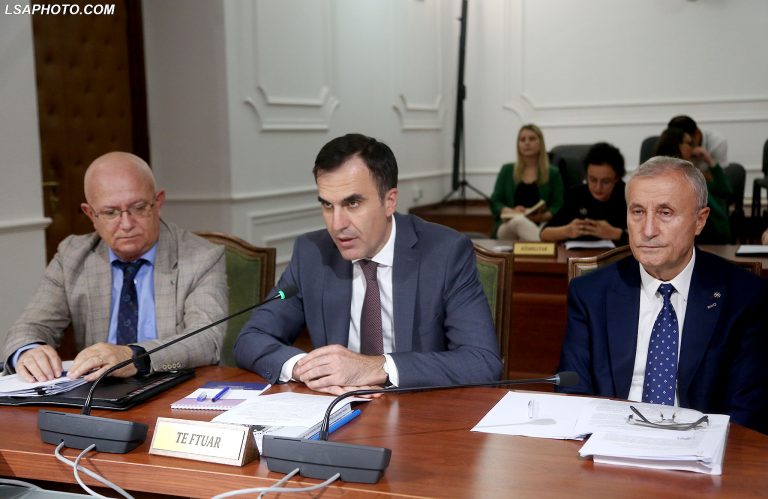
Six years after the approval of justice reform, the Prosecutor General has proposed amendments for more mechanisms regulating accountability and performance concerning regional prosecutors and their management. The ultimate goal, according to him, is to strengthen inter-institutional cooperation and increase the efficiency of prosecutors in resolving citizens’ cases and problems. With the new judicial map being implemented, this becomes even more necessary.
But what is the standard, while the new institutions of the justice system in the country are still in the process of being reformed? While justice reform has undergone several changes throughout 2019, 2020, and 2021, the accountability mechanisms have remained in a status quo.
By Faktoje
In the annual reporting before the High Council of Prosecutors and the Albanian Parliament, Prosecutor General Olsian Çela drew attention to some challenges faced by the institution in exercising its competencies in relation to accountability expectations.
“Everyone expects the Prosecutor General to deliver when they need explanations, but the only mechanism available is a general instruction, which in fact describes obligations for those who must meet them,” the Prosecutor General said in reporting before the Parliament’s Law Committee.
The mechanism to which the Prosecutor General refers, in this case, is the ‘general instructions’ issued to the regional prosecutors.
The Constitution obliges the Prosecutor General to ensure the smooth functioning of the administration of regional prosecutors. However, during the reporting in parliament, the “clash” of competencies between the High Council of Prosecutors and the Prosecutor General himself came to light. The organization of the administration of prosecutors is a “hot potato” that neither lawmakers nor politicians seem willing to address.
Who should reflect?
Based on the past experience as an institution reformed by justice reform, the Prosecutor General seeks a clarification of the law regarding its involvement in the “administration of prosecutors and responsibilities for human resources related to administrative activity in prosecutors.”
In the perspective of the Prosecutor General’s Office, there is a deadlock regarding the evaluation of the performance of prosecutors in the general jurisdiction. Another heated issue that is not explained in the wording of the law is the authority responsible for evaluating the performance of prosecutors. What should not be confused in this case, according to legal experts, is the difference between evaluating the performance of district prosecutors as independent bodies and the ethical and professional evaluation of the prosecutors themselves (the latter being the competence of the High Prosecutorial Council).
The spirit of the law, however, gives the opportunity for the governing bodies such as the Prosecutor General and the High Prosecutorial Council to coordinate their work to achieve the common goal – the proper performance of prosecutors. But the law can take on different shades during implementation, especially in the case of the justice system in Albania, where established tradition and institutional cooperation are lacking or left to the will of the leading personalities.
Another element in the chain of accountability of the prosecutor’s office is the evaluation of the performance of the heads of prosecutors, whom the law has vested with a high degree of independence.
Should the Prosecutor General be legally involved in the appointment, evaluation, suspension, or dismissal of heads of prosecutorial offices?
Legal experts agree on one point. The Law on the Prosecutor’s Office, in the worst case, needs to be re-read. In the best case, it needs to be subject to some technical amendments. These amendments would guarantee the effectiveness of accountability mechanisms in the prosecutor’s system, from the level of general jurisdiction to the highest level of the Prosecutor General’s Office. This does not imply touching the most important principle of justice reform, that of guaranteeing the independence of the prosecutor’s office.
Erida Skëndaj from the Albanian Helsinki Committee emphasizes that with the constitutional changes of 2016, lawmakers assessed that the “separation of powers between the Prosecutor General and the High Council of Prosecutors would influence the increase in internal independence of prosecutors in relation to the higher prosecutors and external independence of the institution.”.
The Chairwoman of the Law Committee, Klotilda Bushka, during the annual report made by the Prosecutor General for his activity, emphasized the need to guarantee the implementation of the General Prosecutor’s instructions, some of which also derive from the High Council of Ministers’ priority recommendations.
“In evaluating prosecutors for promotion, one criterion might undoubtedly be the failure to apply a general order by the candidates. You are guided by the fact that it is not written in the law, but the law has both a letter and a spirit, and it must move towards the principle of functionality,” said Klotilda Bushka during the Prosecutor General’s reporting to the law committee.
At a time when justice reform has reached an irreversible point, it is essential that all parties reflect on the common goal – justice today! Therefore, the standard of independence and accountability, although a new dimension, little known, and little practiced by Albanian institutions, must gradually become a norm and standard that follows Albania’s aspiration to become part of the European family.